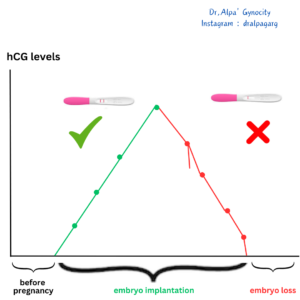A chemical or a biochemical pregnancy is a very early miscarriage. It occurs shortly after conception that usually goes unnoticed and is confused with the menstrual periods. It is called a “chemical” pregnancy because it is detected only at the chemical level, meaning through the detection of hCG levels in the woman’s blood or urine .No gestational sac or embryo can be seen on an ultrasound.

Here are some key points about chemical pregnancies :
Timing: Chemical pregnancies typically occur within the first few weeks after conception. It is often before a woman even realizes she is pregnant.
Detection: They are often identified through home pregnancy tests, which detect the presence of hCG in a woman’s urine. These tests may show a positive result, but subsequent tests may indicate decreasing hCG levels, leading to a negative result.
Causes
The exact reasons behind chemical pregnancies are not always clear, but they can be attributed to various factors, including:
- Chromosomal abnormalities: Most often, chemical pregnancies result from chromosomal abnormalities in the fertilized egg, preventing proper development and implantation.
- Embryonic gene alterations after fertilization.
- Hormonal issues: Imbalances in hormones, such as low progesterone levels, can interfere with the embryo’s ability to implant and grow in the uterine lining.
- Uterine issues: Abnormalities in the uterus, such as polyps or fibroids, may interfere with implantation and early development of the embryo.
- Maternal age: The risk of chromosomal abnormalities in the egg increases as a woman gets older, making older women more prone to chemical pregnancies.
- Unhealthy lifestyle habits of the parents: tobacco, alcohol, high levels of stress, etc.
Symptoms
The majority of people who have had a chemical pregnancy never actually realize they’ve conceived, since the only real symptom is a late period. Contrary to the expectation of heavier menstrual bleeding, a chemical pregnancy often presents with bleeding that is comparable to a typical period. Additional indicators of a chemical pregnancy may encompass:
- Low levels of hCG detected in a blood test.
- Experiencing mild abdominal cramping, sometimes more intense than the usual menstrual cramps.
- Notable spotting occurring approximately a week prior to the expected period (distinct from implantation bleeding, which occurs in early pregnancy).
Given the presence of pregnancy hormones at low levels in a chemical pregnancy, you would not typically encounter other common early pregnancy signs, such as fatigue or nausea.
It’s crucial to acknowledge that while a chemical pregnancy usually doesn’t result in physical harm, it can evoke emotional distress. Even the earliest form of pregnancy loss can trigger profound feelings of sorrow and grief.
Most miscarriages, as well as biochemical pregnancy, are usually caused by chromosomal abnormalities in the embryo or gametes. Therefore, there is nothing that can be prevented. However, there are recommendations to mitigate the risk of chemical pregnancies.
- Healthy Lifestyle: Maintaining a healthy lifestyle, which includes regular physical exercise, a balanced diet, and stress management, can benefit overall well-being. Reducing stress and ensuring that your body is in good physical condition may indirectly support a healthy pregnancy.
- Iron and Folic Acid: Iron-rich foods and folic acid supplements are essential during pregnancy, not only for preventing miscarriages but also for the proper development of the fetus. Folic acid, in particular, is crucial for neural tube development and is recommended for women planning to become pregnant.
- Medical Guidance: It’s essential to consult with a healthcare provider before taking any supplements, including folic acid. They can provide personalized recommendations based on your specific health needs. An excessive intake of certain vitamins and minerals can be harmful, so it’s important to follow medical advice.
- Avoid Smoking and Alcohol: Smoking and excessive alcohol consumption are well-known risk factors for pregnancy complications, including miscarriages. It’s highly advisable for women trying to conceive or during pregnancy to abstain from these substances to reduce potential risks to both the mother and the developing baby.
SUMMARY
Chemical pregnancies are early and often inconspicuous losses that can be emotionally challenging. Understanding their subtle signs and potential causes can empower individuals to seek support and make informed choices. While they may not always be preventable, maintaining a healthy lifestyle and avoiding harmful habits can help reduce the risk. It’s essential to acknowledge the emotional impact of chemical pregnancies and offer compassion to those affected, knowing that hope for a successful pregnancy remains.
